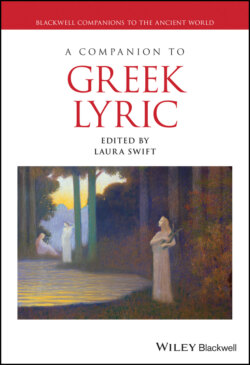Читать книгу A Companion to Greek Lyric - Группа авторов - Страница 16
Epilogue
ОглавлениеThe preceding discussion focused on the great masters of the archaic and early classical period and their choral compositions for female and male choruses at the apogee of the song-dance culture. Choral activity does not of course die with Pindar. As Ewen Bowie has argued, choral activity remains a marker of Greek identity well into the Roman period.60 What survives however suggests that by the end of the fifth century Pindar’s compositions were already “silent” (according to Eupolis because of people’s indifference to beauty).61 The fractures through our scant and fragmentary evidence suggest that women had a more important role both as choreuts and chorodidaskaloi in the artistic and cultic life of the Greek cities than our surviving evidence allows us to establish. There must have been countless gifted women who, like Andaisistrota, trained young girls but only one, Sappho, made it to the canon of the nine lyric poets and was considered the tenth Muse. The various angles on the theme of the aging poet/chorodidaskalos must have reflected the anxiety professional poets felt at the prospect of reaching an age when they could no longer teach and lead choruses. It was not simply an anxiety at quitting a profession. We have seen that comparisons of the performance of female choruses with the irresistible appeal of the Sirens revealed the inspiration and the pleasure that the chorodidaskaloi derived from their interaction with choruses, and that inspiration and pleasure is something they would miss. In the archaic and early classical period choral instruction had a divine model, on the pedagogical significance of which Plato capitalized later. The Muses, Apollo, and Dionysus were believed to be the mortals’ fellow-choreuts and fellow-celebrants. This privileged relationship of human choruses with the gods had important implications for their cultic authority and musical virtuosity, for like the poets, choruses could also claim that their art had divine origin.
